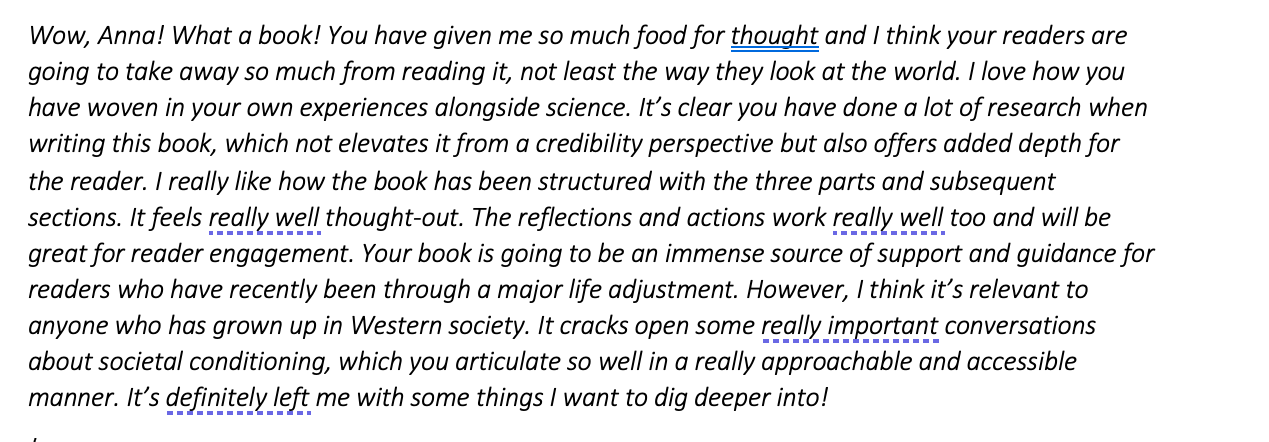Why do we lack self-belief?
“You do not win by struggling to the top of a caste system, you win by refusing to be trapped within one at all.”
― Naomi Wolf, The Beauty Myth
This week I got my book back from the editor, and to be honest, I was a bit nervous about what she would say and I wasn’t sure what to expect. At one point I noticed a lot of self-doubt and part of me expected to receive a fair bit of criticism, even if only constructive.
My editors email consisted of four documents, an editorial report, 2 versions of the manuscript and a style guide. She recommended that I start by reading the editorial report, so that’s what I did.
I mentally prepared myself for all sorts of scenarios. Maybe she'd suggest plenty of changes as a polite way to let me know it's not that great, or she might even say that the book just doesn't work. So, I was ready for the worst.
And then, when I finally opened the editorial report and saw this, I was taken by surprise.
Never once during this writing journey did I entertain the thought that my book would be anything more than average, let alone receive such high praise like, "Wow, Anna! What a book!” – and that made me sad.
Despite everything I've managed to achieve in my life, I can't shake off the feeling that I'm not smart enough or deserving of being at the same level as those whom I truly admire. So I ask myself, why?
I go into great detail about the reasons why we often struggle to believe in ourselves or feel like we’re not enough in my upcoming book. However, I’ll do my best to summarise some of these in the following seven points.
7 Reasons why we might lack self-belief:
Past Failures: Previous setbacks or failures can make us doubt our abilities and create a fear of repeating those experiences.
Comparison with Others: Constantly comparing ourselves to others, especially in areas where we feel inferior, can undermine our self-confidence and belief in our own worth.
Negative Feedback: Receiving criticism or negative feedback, especially during formative years, can erode our self-belief and create self-doubt.
Limited Comfort Zones: Sticking to our comfort zones and avoiding challenges can prevent us from experiencing success and hinder our self-belief.
Perfectionism: Setting impossibly high standards for ourselves can lead to a perpetual feeling of falling short, making it difficult to believe in our capabilities.
Lack of Support: The absence of a supportive environment or encouragement from others can make it harder for us to believe in ourselves.
Internalised Limiting Beliefs: Internalising negative beliefs about our worth and capabilities, often influenced by societal or cultural factors, can diminish our self-belief.
So how can we strengthen our self-belief and genuinely recognise our own value?
Although all the reasons given above are important, it’s point 2, comparing ourselves to others, that I’d like to explore further.
When Former first lady Michelle Obama was asked what advice she would give to any young woman that struggles with self-doubt she made this controversial statement:
“I have been at probably every powerful table that you can think of, I have worked at nonprofits, I have been at foundations, I have worked in corporations, served on corporate boards, I have been at G-summits, I have sat in at the U.N: They are not that smart!”
When I heard Obama say that it immediately resonated with me. While I may not have been in her high profile position, I have sat in many board rooms and met people with power, often leaving me astonished at their lack of substance. It became evident to me that many of these individuals possess significantly lower emotional intelligence compared to those they routinely underestimate, often dismissing as “uneducated” or “not good enough”
And this is the problem with comparing ourselves with so called “experts” or people in positions of authority.
It's easy to assume that they have attained their status purely through merit. But in reality, most people who reach the heights of power do so because they have cultivated relationships with the right individuals, possess adept self-promotion skills, or are skilled at convincingly projecting a persona that may not truly reflect who they are.
As I write in my book, success is no sign of greatness or self-worth, instead, it serves to indicate one’s ability to adapt and thrive within a system that selectively rewards those who conform to the established norms.
It is rare for genuinely talented individuals to attain the status or recognition they truly deserve because often these individuals refuse to conform and they are usually the ones that challenge the status quo. They can’t get into the “boys club” unless they are willing to completely compromise on their personal values and for many that is too high a price to pay.
For me, the absence of self-belief stems from a combination of all the points raised earlier. However, above all else, it has its roots in my upbringing in a world that unjustly denies strong, assertive, non-conforming women the opportunities they genuinely deserve.
And I suppose at some point I made the conscious choice to distance myself from anything I didn't wholeheartedly believe in.
So if comparing yourself to others is what prevents you from fully believing you are at the very least as good as them, remember that the ones you are comparing yourself too might not be that smart after all!

